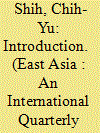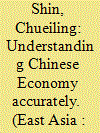|
|
|
Sort Order |
|
|
|
Items / Page
|
|
|
|
|
|
|
| Srl | Item |
| 1 |
ID:
134184


|
|
|
|
|
| Publication |
2014.
|
| Summary/Abstract |
Southeast Asian studies of Chinese humanities are intertwined with the changing discourses and practices of Chineseness of indigenous Chinese residents. However, scholars rarely encounter this subject. Humanity and pragmatism are two distinctive features of how intellectuals of Southeast Asia understand China and Chineseness in the twenty-first century. These features emerge because descendants of Chinese historical migrants comprise a significant portion of the population in Southeast Asian countries. The strategy of survival and development of the descendants, along with their evolving self-understanding, inevitably affects the perspectives on China and Chinese studies in their countries. These studies simultaneously implicate subjectivity, which pertains to how authors and their readers position themselves among ethnic, national, and civilizational identities.
|
|
|
|
|
|
|
|
|
|
|
|
|
|
|
|
| 2 |
ID:
134188


|
|
|
|
|
| Publication |
2014.
|
| Summary/Abstract |
During the first two decades of the twentieth century, Sinology was known in Vietnam as "Hán h?c ??" (or occasionally as "Trung h?c ??"), and due to the country's long history of Confucian civil service examination, "Hán h?c"/"Trung h?c" was identified with Confucianism and Confucian learning. In order to avoid any grand narrative that overlooks the multifacetedness of reality, writing about the history of Vietnamese Sinology should start with "local narrative," trying to answer a series of "WH-questions" to form a small piece of the jigsaw puzzle. Following this direction, the present paper focuses on the promotion of Confucian ethics in early twentieth century Vietnam through the case of a bulletin called Du h?c báo ??? published under the sponsorship of the Nguy?n court in the protectorate Annam. In order to modernize their "half colonial, half feudal" kingdom technologically without touching the foundation of their political system, the Nguy?n court employed the bulletin as a forum to promote Confucian values interpreted accordingly to Western philosophy and ethics to keep their young elites away from socialist/communist influence during their overseas study.
|
|
|
|
|
|
|
|
|
|
|
|
|
|
|
|
| 3 |
ID:
134185


|
|
|
|
|
| Publication |
2014.
|
| Summary/Abstract |
This paper seeks to analyze the development of three aspects of Chinese Studies, namely Sinology, China Studies, and Chinese Overseas Studies in Malaysia. Each aspect corresponds to different levels of looking at China: civilizational, state, and ethnic. It also examines how identity politics in Malaysia shapes the development of these fields and how these fields created different images of China. Sinology depoliticizes China and presents the magnificent Chinese culture as a positive element in Malaysian nation-building project. Chinese Overseas Studies de-centers China and examines the multiple identities of the Chinese people. China Studies were officially pursued under the agendas of inter-civilizational dialogue and friendship between China and Malaysia.
|
|
|
|
|
|
|
|
|
|
|
|
|
|
|
|
| 4 |
ID:
134187


|
|
|
|
|
| Publication |
2014.
|
| Summary/Abstract |
The intellectual paths of two Vietnamese sinologists, Nguyen Huy Quy and Phan Van Cac, tell a distinctive history of Confucian scholarship in Vietnam. Through their intellectual growth, we hope to show how humanities have survived political upheavals of and between the two countries and returned in the process of national reform. The perseverance of humanist concerns demonstrates the relevance of individual determination in the evolution of Vietnamese scholarship on China, indicating an epistemological agency to transcend politics. Three particular aspects emerge as critical in the evolution of their scholarship: family, travelling, and determination. The mechanisms of historical cycles, strategic silencing, self-learning, and human judgment connect the individual paths to the larger historical context of Vietnamese sinology.
|
|
|
|
|
|
|
|
|
|
|
|
|
|
|
|
| 5 |
ID:
134189


|
|
|
|
|
| Publication |
2014.
|
| Summary/Abstract |
How and to what extent can China be more accurately understood? Is China best understood as it is or through theories that appear to reveal its nature? John Wong is an example of the former approach, a pursuer of economic realism in the discipline of economic analysis. This paper first describes John Wong's conceptual model of Chinese economic development, which consists of three major components: Singapore as the reference point; economic scale as the first adjusted variable; and economic development phase as the second variable. The paper further explores sources of his choice of methodology through the positionality of his research. He cannot be neatly categorized in any existing school of economic analysis of the Western academic tradition but pursues his accurate understanding of China through pragmatism; his institutionalized research position constitutes the methodological foundation for his research strategy and conceptual framework.
|
|
|
|
|
|
|
|
|
|
|
|
|
|
|
|
|
|
|
|
|